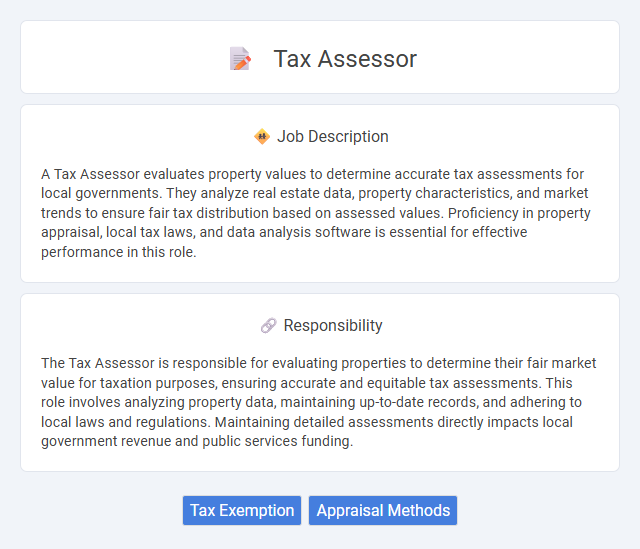
A Tax Assessor evaluates property values to determine accurate tax assessments for local governments. They analyze real estate data, property characteristics, and market trends to ensure fair tax distribution based on assessed values. Proficiency in property appraisal, local tax laws, and data analysis software is essential for effective performance in this role.
Individuals with strong analytical skills and attention to detail are likely suitable for a tax assessor role, as the job demands accurate property evaluations and tax calculations. Candidates comfortable with numbers, local tax laws, and public interaction may find this occupation fitting, while those averse to routine tasks or regulatory requirements might face challenges. The probability of success in this job increases for those who can work independently, manage deadlines, and maintain impartiality in assessments.
Qualification
A Tax Assessor typically requires a bachelor's degree in finance, accounting, economics, or public administration, emphasizing proficiency in property tax laws and valuation techniques. Strong analytical skills, attention to detail, and experience with geographic information systems (GIS) or appraisal software enhance job performance. Certification such as the Certified Assessment Evaluator (CAE) designation further validates expertise and can improve career advancement prospects.
Responsibility
The Tax Assessor is responsible for evaluating properties to determine their fair market value for taxation purposes, ensuring accurate and equitable tax assessments. This role involves analyzing property data, maintaining up-to-date records, and adhering to local laws and regulations. Maintaining detailed assessments directly impacts local government revenue and public services funding.
Benefit
Tax assessor positions likely offer financial stability through consistent government employment and competitive salaries. The role may provide opportunities for career advancement within public administration. Benefits often include comprehensive health plans, retirement options, and paid time off.
Challenge
Tax assessor roles often involve the challenge of accurately valuing diverse types of property under fluctuating market conditions. There is a probability of encountering complex legal and regulatory changes that require continuous learning and adaptation. Navigating public scrutiny and ensuring fair assessments could also present significant difficulties.
Career Advancement
Tax Assessors can advance their careers by gaining expertise in property valuation, real estate law, and tax codes, positioning themselves for senior assessor or administrative roles. Pursuing certifications such as Certified Assessment Evaluator (CAE) enhances credibility and opens opportunities for management or specialized assessment positions. Experience in data analysis and proficiency with geographic information systems (GIS) further support career growth within government agencies or private appraisal firms.
Key Terms
Tax Exemption
Tax Assessors play a crucial role in evaluating property values to determine eligibility for tax exemptions such as homestead, senior citizen, and veteran exemptions. Accurate assessment ensures property owners receive the correct tax relief while maintaining compliance with local and state regulations. Expertise in exemption criteria and documentation processing maximizes taxpayer benefits and supports fair property tax distribution.
Appraisal Methods
Tax Assessors utilize various appraisal methods including the market approach, cost approach, and income approach to determine property values accurately. The market approach compares similar property sales to assess fair market value, while the cost approach estimates value based on replacement cost minus depreciation. Income approach evaluates properties based on their potential to generate income, crucial for commercial real estate assessments.
 kuljobs.com
kuljobs.com